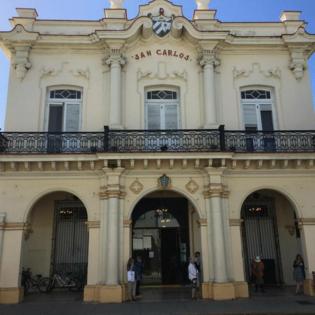Does Cuba own this Key West landmark? Heir of Castro victim seeks sale of historic center
Published in News & Features
One of the most iconic buildings in Key West, built by Cuban exiles in the 19th century as they fought for independence from Spain and now a Cuban heritage center, is in the midst of a legal battle over its ownership.
The surprising question at the heart of the litigation: Whether the San Carlos Institute, on Key West’s storied Duval Street, actually belongs to the government of Cuba.
A lawsuit in Miami-Dade court, which claims Cuba is the San Carlos’ sole owner, seeks the sale of the institute, and the proceeds turned over as compensation to the family of a man killed by Fidel Castro’s forces in 1959.
The San Carlos Institute was founded by Cuban exiles in 1871 as a school and civic center, three decades before Cuba became a republic in 1902 after the Spanish-American War. The institute holds a special place for Cubans because 19th century writer Jose Martí, Cuba’s national hero, used the institute in 1892 to publicize his intention to create the Cuban Revolutionary Party, which led independence efforts.
After falling into disrepair and being rebuilt with private and state funding in the 1980s, the San Carlos currently houses a museum, a theater and a school. The center became a symbol of Cuban exiles’ contributions to Key West and has regularly hosted major city events like the Literary Seminar and the Key West Film Festival. U.S. Rep. Carlos Gimenez, the former Miami-Dade mayor who now represents Monroe County in Congress, was sworn in at the institute for a second term last year.
“The San Carlos Institute is of great significance to the Cuban exile community. It was at the San Carlos where José Martí spoke and organized Key West’s exile community to assist Cuba during the struggle for independence,” said Giménez. “Key West is in my district and as the only Cuban-born member of Congress, I was honored to be ceremonially sworn in at the San Carlos. While I do not know the particulars of this case, it will certainly be my hope that the San Carlos remains in the hands of its current stewards to preserve this monument’s history for generations to come.”
Over the years, the institute, currently run by the not-for-profit corporation Instituto Patriótico y Docente San Carlos, Inc., has been the subject of bitter legal fights among different exile groups over its control. Court records show that at least part of the institute’s real estate is held in trust — with the government of Cuba as trustee and the institute as beneficiary.
Cuba’s Communist government has laid claim to ownership of the institute in the past.
When a group allegedly backed by the Cuban government unsuccessfully claimed to be the rightful owner of the San Carlos in a 1994 lawsuit, a Cuban diplomat wrote a letter stating that Cuba was “the title holder, owner and trustee of certain real property deeded to it in trust for the use and benefit of the San Carlos Institute.”
That letter was dismissed by a Florida judge, but the institute now faces a new existential threat. This time, a Florida court will decide if the San Carlos should be sold to pay compensation to Marilyn Wiederspan, whose father, Jose Velasquez Fernandez, was killed by one of Castro’s firing squads in the early days of the Cuban Revolution.
...continued
©2024 Miami Herald. Visit at miamiherald.com. Distributed by Tribune Content Agency, LLC.







Comments